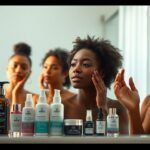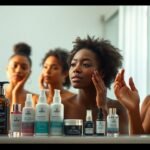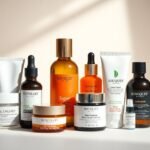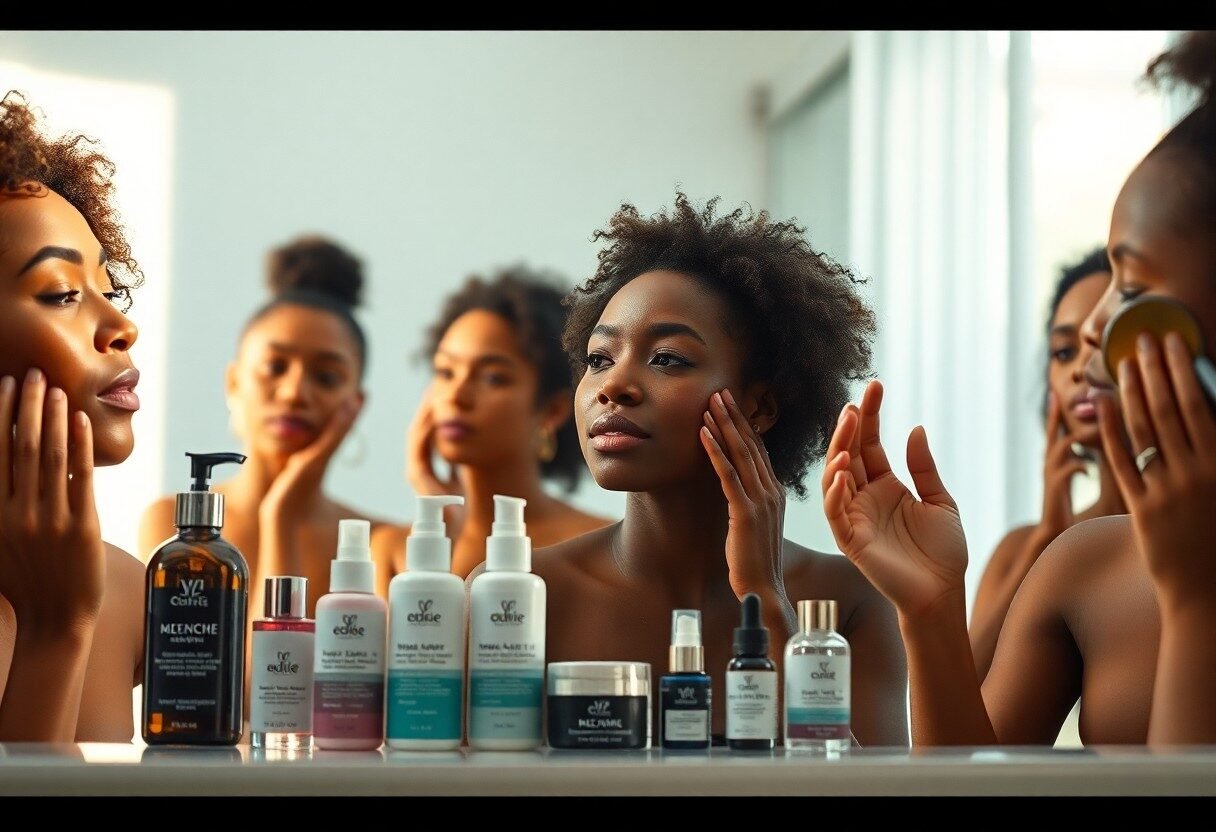
Many Black women experience the frustrating challenge of hormonal acne, which can be exacerbated by factors such as hormonal fluctuations and skin type. I understand that selecting the appropriate skincare products tailored to your unique needs is vital for effectively managing breakouts and maintaining healthy skin. In this post, I will share my insights into the best products and practices that can help you achieve clearer skin, ensuring you feel confident and empowered in your beauty journey.
Key Takeaways:
- Hormonal acne in Black women may present differently, often appearing as cystic bumps or hyperpigmentation, necessitating targeted treatment strategies.
- Incorporate products with salicylic acid, benzoyl peroxide, and retinoids, as these ingredients effectively combat acne while promoting cell turnover.
- Hydration is vital; opt for lightweight, non-comedogenic moisturizers to maintain skin balance without exacerbating breakouts.
- Consider formulations with niacinamide or azelaic acid to help reduce inflammation and even skin tone, addressing both acne and post-inflammatory hyperpigmentation.
- Patch testing new products is vital to avoid potential irritations or allergic reactions, especially with sensitive or reactive skin types.
- Sunscreen is a must; using broad-spectrum SPF daily protects skin from UV damage, preventing further darkening of hyperpigmented areas.
- Consult with a dermatologist for personalized skincare regimens and treatment options, which may include hormonal therapies in addition to topical products.
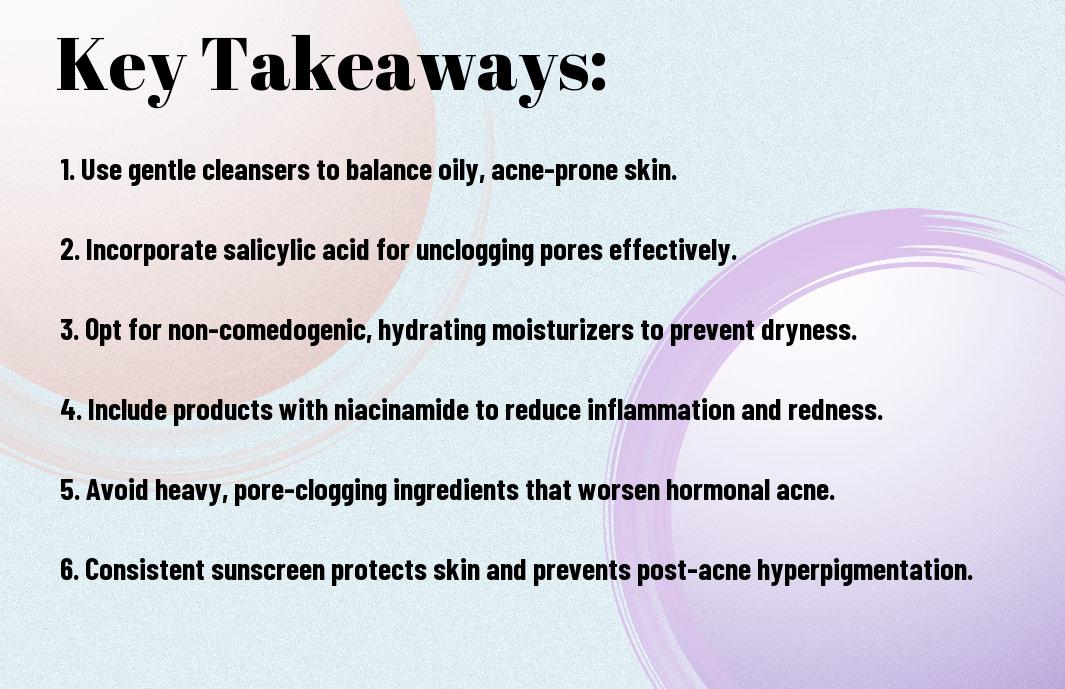
Decoding the Unique Characteristics of Hormonal Acne in Black Women
Hormonal acne presents distinct challenges for Black women, often coupled with unique skin responses such as increased melanin production. The presence of these dark brown or purple post-inflammatory hyperpigmentation marks can make it difficult to manage and treat effectively. Additionally, hormonal fluctuations can trigger breakouts in specific areas, contributing to both physical and psychological distress. Understanding how hormonal shifts interact with Black skin is important for effective treatment and prevention strategies.
The Impact of Hormonal Fluctuations
Hormonal fluctuations, particularly during menstruation, pregnancy, or menopause, are key drivers behind the emergence of hormonal acne. In Black women, elevated levels of androgens may lead to excessive sebum production, which can clog pores and result in breakouts. Additionally, stress-related hormones like cortisol can heighten inflammation, exacerbating existing acne conditions. Adapting your skincare routine to align with these hormonal changes can be vital for clearer skin.
Cultural and Genetic Considerations in Skin Response
The interplay of culture and genetics significantly influences how Black women experience and respond to acne. Genetic predispositions may make certain individuals more susceptible to hormonal acne; for example, individuals with a family history of acne may be at greater risk. Furthermore, cultural beauty standards can affect how we perceive and treat our skin, emphasizing the need for tailored skincare advice that aligns with our unique experiences.
From a genetic perspective, studies indicate that Black women may have a higher prevalence of acne-related genes, which can contribute to a different skin composition compared to other ethnic groups. For instance, variations in skin thickness and sebum production might lead to more pronounced breakouts or differences in scarring. Coupled with cultural factors that shape our skincare approaches, these elements underscore the importance of personalized skincare regimens that cater specifically to our needs. Understanding these nuances allows for more effective treatment, fostering a positive relationship with our skin and reducing the stigma often associated with acne in the Black community.
Formulating an Effective Skincare Regimen
Creating an effective skincare regimen to tackle hormonal acne involves a balanced approach tailored to the unique needs of your skin. Begin with a gentle cleanser that targets impurities without stripping your skin of its natural oils. Follow this up with treatments that include targeted ingredients, and always incorporate a reliable moisturizer to maintain skin hydration. Consistency is key, so stick to your routine, allowing time for your products to work effectively.
Key Ingredients That Work for Oily and Acne-Prone Skin
Look for skincare products featuring ingredients like salicylic acid, which dives deep into pores to clear out excess oil and prevent breakouts. Glycolic acid serves as an excellent exfoliant, encouraging cell turnover and reducing the appearance of scars. Niacinamide helps to regulate oil production and calm inflammation, making it a powerhouse ingredient for those with acne-prone skin.
The Role of Moisturizers in Acne Management
Moisturizers are vital in managing acne, particularly for oily and combination skin types. The misconception that oily skin doesn’t require moisture can exacerbate issues; without hydration, your skin may produce even more oil to compensate. Selecting a lightweight, non-comedogenic moisturizer helps balance your skin’s moisture levels while avoiding clogged pores. Look for hydrating ingredients like hyaluronic acid or glycerin, which offer moisture without heaviness, ensuring your skin remains plump and healthy.
Tailoring Treatments: Product Recommendations
Choosing the right skincare products can make all the difference in managing hormonal acne effectively. I recommend focusing on non-comedogenic products that are specifically formulated for your skin type. Look for ingredients such as salicylic acid, niacinamide, and retinoids to reduce inflammation and prevent future breakouts. Always consider your skin’s unique needs, and don’t hesitate to consult with a dermatologist for personalized suggestions.
The Best Cleansers to Combat Clogged Pores
For unclogging pores, I suggest a gentle yet effective cleanser containing salicylic acid. This beta hydroxy acid penetrates deeply into the skin, helping to exfoliate and remove dead skin cells. Brands like Neutrogena and CeraVe offer excellent options that cater to oily and combination skin without stripping moisture.
Spot Treatments Versus Full-Face Solutions
Spot treatments are designed to target individual pimples and can provide rapid relief, while full-face solutions address broader concerns, such as preventing future breakouts. If you’re experiencing occasional hormonal flare-ups, spot treatments with powerful actives like benzoyl peroxide work wonders. However, if you want to maintain overall skin health, incorporating a full-face treatment with ingredients like azelaic acid can be fruitful in combating both acne and ensuring even skin tone.
Spot treatments can be great for those occasional blemishes that you want to zap quickly. Products containing benzoyl peroxide or sulfur target the bacteria that cause acne. On the other hand, full-face solutions, such as serums with retinol or niacinamide, not only minimize existing breakouts but also help improve overall skin texture and tone. This dual approach often yields the best results, as it not only addresses current acne lesions but also helps to prevent new ones from forming. Tailor your approach based on your skin condition, and feel empowered to try different combinations to find what works best for you.
Beyond Products: Lifestyle Adjustments That Help
Balancing your hormones effectively extends beyond skincare products. Approaching your lifestyle holistically can offer significant benefits in managing hormonal acne. Simple adjustments in your daily routine can enhance your skin’s health and overall well-being. Factors like diet, exercise, and stress management play vital roles in maintaining hormonal balance and, subsequently, clearer skin. By making intentional choices, you can achieve a more harmonious environment for your body and skin.
Dietary Influences on Hormonal Balance
Your diet plays a vital role in hormonal balance, which directly influences your skin’s health. Incorporating whole foods rich in antioxidants, fiber, and healthy fats can promote hormonal stability. Think of foods like leafy greens, fatty fish, nuts, and seeds. I’ve found that reducing processed sugars and dairy can also lead to noticeable improvements in my skin’s clarity and texture.
Stress Management Techniques and Their Effects on Skin
High stress levels can trigger hormonal fluctuations that lead to increased oil production and breakouts. Implementing stress management techniques, such as meditation, yoga, or deep-breathing exercises, has proven beneficial for my skin. You might find that even a daily 10-minute mindfulness practice can calm your mind and balance your hormones.
Research shows that chronic stress increases levels of cortisol, which exacerbates acne breakouts. I’ve observed that regular physical activity serves as a powerful stress-reliever and can help in reducing cortisol levels. Engaging in enjoyable activities, whether it’s dancing, running, or spending time with loved ones, creates a positive feedback loop for your mental and emotional health, leading to improvements in your skin as stress decreases.
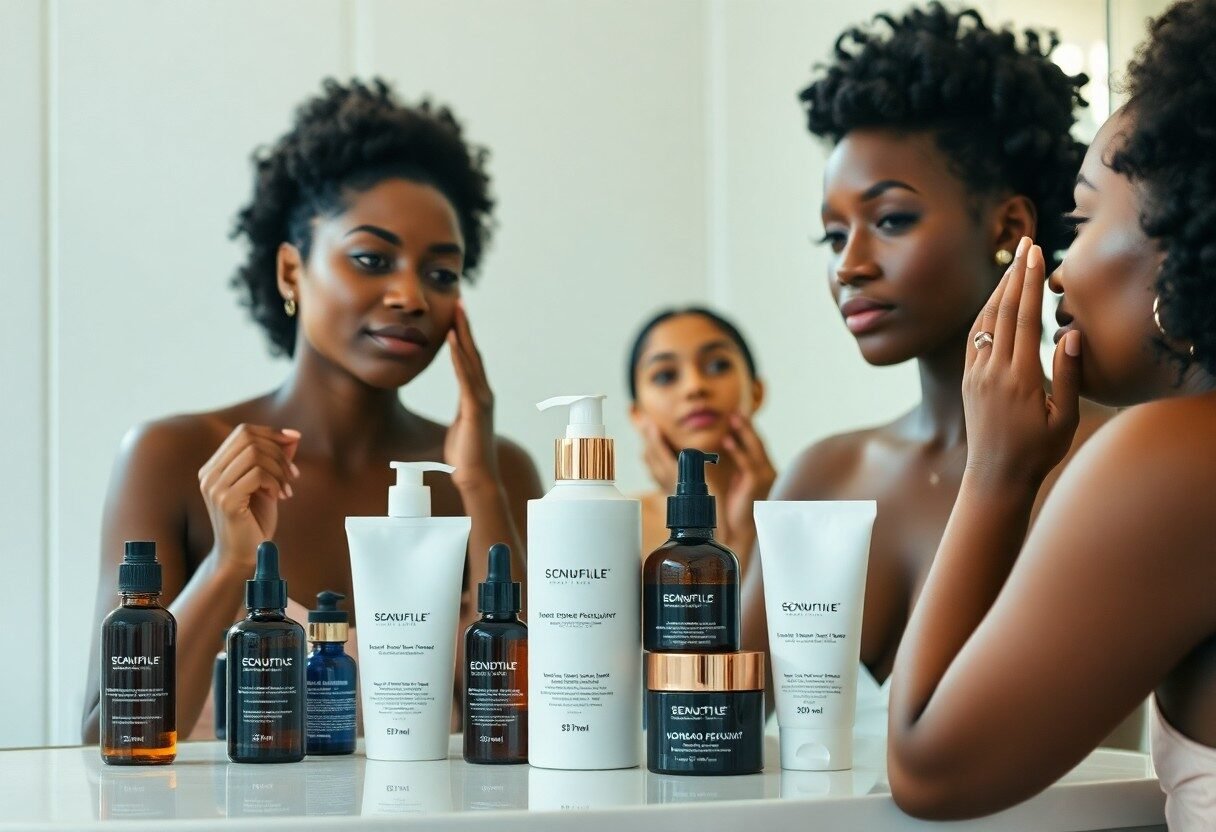
Expert Insights: Dermatologists Weigh In
Consulting with dermatologists reveals that understanding individual skin types and hormonal patterns is vital in treating hormonal acne. Experts recommend formulations that focus on non-comedogenic ingredients and hydration, as many Black women may experience dryness from acne treatments. They also emphasize that consistency is key; results often take time and might require a combination of products tailored to your unique skin needs.
Common Myths About Hormonal Acne and Black Skin
A prevalent myth suggests that hormonal acne only affects teenagers or individuals with oily skin, but this is not the case for many Black women. Acne can manifest at any age due to fluctuations in hormones, particularly during menstrual cycles or hormonal changes like pregnancy. Another misconception is that darker skin types are immune to scarring; in reality, hyperpigmentation is often more pronounced in Black skin following acne breakouts, making effective treatment vital.
Professional Treatments Versus Over-the-Counter Solutions
Choosing between professional treatments and over-the-counter options often comes down to the severity of your hormonal acne. While over-the-counter solutions like benzoyl peroxide or salicylic acid can work for mild cases, persistent or severe acne may warrant a visit to a dermatologist for tailored prescription treatments, such as topical retinoids or hormonal therapy. A professional’s guidance can significantly enhance your skincare plan, especially if you’re dealing with hyperpigmentation, as they can recommend specific procedures like chemical peels or laser therapy for optimal results.
Over-the-counter products can be effective for managing mild flare-ups, but they often lack the potency of prescription treatments. Dermatologists may suggest a combination approach, where initial professional guidance allows you to establish a baseline regimen with professional products before integrating over-the-counter options for maintenance. This strategy ensures that you’re using the most effective treatments tailored to your skin’s responses, addressing both the acne and any hyperpigmentation that may result from it.
Summing up
With this in mind, finding the right skincare products to manage hormonal acne is necessary for Black women seeking effective solutions. I encourage you to focus on ingredients that cater to your unique skin needs, such as salicylic acid and niacinamide, while avoiding harsh chemicals that can exacerbate issues. You should also consider consulting with a dermatologist to personalize your routine and make informed choices. By prioritizing your skincare regimen with the right products, you can take meaningful steps toward clearer and healthier skin.
FAQ
Q: What is hormonal acne and what causes it in Black women?
A: Hormonal acne is a type of acne that is influenced by hormonal fluctuations, often occurring during menstrual cycles, pregnancy, or hormonal changes that impact oil production in the skin. In Black women, this can be exacerbated by factors such as hyperpigmentation, which can make breakouts more noticeable. Common causes include menstrual cycles, PCOS, stress, and certain medications.
Q: How can I identify the best skincare products for my hormonal acne?
A: When seeking skincare products for hormonal acne, look for products that are non-comedogenic (won’t clog pores), gentle, and formulated for acne-prone skin. Ingredients like salicylic acid, benzoyl peroxide, niacinamide, and tea tree oil can be beneficial. Always consider your skin’s unique tone and texture to select products that cater specifically to Black skin, which may also offer additional moisturizing properties.
Q: Should I avoid certain ingredients when treating hormonal acne?
A: Yes, some ingredients can aggravate hormonal acne and should be avoided. Products high in alcohol, fragrances, or harsh exfoliants can lead to increased irritation or dryness. Also, avoid overly heavy oils and creams that may not be suitable for acne-prone skin. It’s best to consult with a dermatologist for personalized advice.
Q: How important is moisturizing when dealing with hormonal acne?
A: Moisturizing is very important, even for acne-prone skin. Using a lightweight, oil-free moisturizer helps balance your skin’s hydration levels without clogging pores. Look for moisturizers with hydrating ingredients like hyaluronic acid, which can provide moisture without adding excess oil, helping to prevent acne flare-ups.
Q: Can lifestyle changes help manage hormonal acne?
A: Absolutely! Lifestyle changes like maintaining a balanced diet, staying hydrated, managing stress through techniques like yoga or meditation, and getting adequate sleep can all play a role in managing hormonal acne. Additionally, minimizing the use of harsh hair products and avoiding tight hairstyles can reduce breakouts along the hairline.
Q: Is sun protection necessary for treating hormonal acne?
A: Yes, sun protection is necessary when treating hormonal acne. Sun exposure can darken existing scars and hyperpigmentation, which is especially relevant for Black women whose skin can be more prone to post-inflammatory hyperpigmentation after breakouts. Use a broad-spectrum sunscreen with SPF 30 or higher, and reapply regularly for best results.
Q: When should I seek professional help for my hormonal acne?
A: If you notice that over-the-counter treatments are not effective, or if your hormonal acne is severe, persistent, or causing significant distress, it’s advisable to schedule an appointment with a dermatologist. They can offer prescription medications, professional-strength treatments, or a personalized skincare routine tailored to your specific needs, ensuring optimal results.
